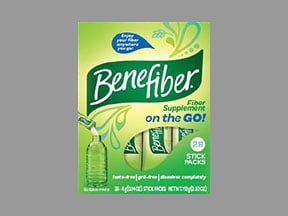
Benefiber On The Go Coupons & Savings Card – Discount Prices from $4.56
My prescription
Edit
1, Benefiber On The Go (28 Powders)
Select pharmacy

Albertsons
$4.56
COUPON PRICE
Walgreens
$4.56
COUPON PRICEBenefiber On The Go savings card
Show this card to your pharmacist
Albertsons
$4.56
BIN
ID
PCN
GRP
011867
LHEAF1EB68
HT
LABH001
Powered by
Price history for Benefiber On The Go
28 Powders, 1nan
Average retail price for Benefiber On The Go
Average SaveHealth price for Benefiber On The Go
Our price history data is based on aggregated prescription data collected from participating pharmacies in America. Our prescription data updates daily to reflect the latest price changes. If you notice a missing data point, it means there wasn't sufficient data available to generate a monetary value for that date.
*Retail prices are based on pharmacy claims data, and may not be accurate when we don't have enough claims.
Benefiber On The Go dosage forms
Dosage Quantity Price from Per unit 1nan 28 Powders $11.26 $0.40
| Dosage | Quantity | Price from | Per unit |
|---|---|---|---|
| 1nan | 28 Powders | $11.26 | $0.40 |
What does Benefiber on the go do?
Benefiber On-the-Go is a fiber supplement that helps support digestive health. It contains wheat dextrin, a soluble fiber that can aid in maintaining regular bowel movements and may help with overall digestive wellness. It is designed for convenience, allowing individuals to easily add fiber to their diet by mixing it into beverages or soft foods without altering the taste or texture.
Why has Benefiber been discontinued?
Benefiber has not been discontinued. However, there have been temporary shortages or supply issues in the past due to manufacturing or distribution challenges. It is advisable to check with local pharmacies or retailers for availability or consult the manufacturer for the most current information.
Is Benefiber a laxative or stool softener?
Benefiber is neither a laxative nor a stool softener. It is a fiber supplement that helps to increase dietary fiber intake, which can aid in maintaining regular bowel movements.
What is a substitute for Benefiber?
A substitute for Benefiber, which is a fiber supplement, could be other fiber supplements such as Metamucil, Citrucel, or FiberCon. These products contain different types of fiber, such as psyllium or methylcellulose, and can help with dietary fiber intake. It's important to choose a product that suits individual dietary needs and preferences, and consulting with a healthcare provider is recommended to ensure it is appropriate for one's health condition.
Which is better to take, Benefiber or Metamucil?
The choice between Benefiber and Metamucil depends on individual needs and preferences. Benefiber contains wheat dextrin, a soluble fiber that dissolves completely in water and is tasteless, making it easy to mix into various foods and beverages. Metamucil contains psyllium husk, which is also a soluble fiber but may provide additional benefits for cholesterol management and blood sugar control. However, it can have a thicker texture and a distinct taste. It's important to consider dietary needs, any specific health conditions, and personal preferences when choosing between the two. Consulting with a healthcare provider can help determine the best option for individual circumstances.
